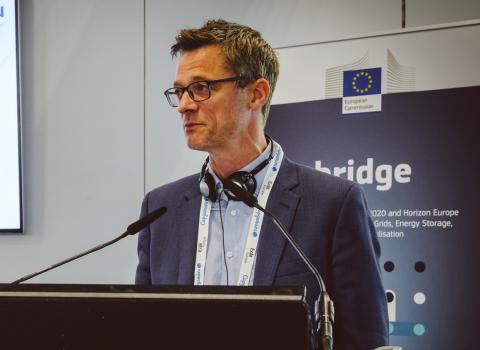Five per cent of Swedish adults are involved in setting up new businesses, and almost 6 per cent have invested in a business started by someone else, according to a new comparative study of entrepreneurial dynamics, published by the Swedish Entrepreneurship Forum and based on data from the Global Entrepreneurship Monitor (GEM).
The number of people actively involved in starting a business in Sweden is growing faster than in Germany and France, which along with Portugal, Italy, Greece and Spain, have the lowest levels of entrepreneurial activity in Europe.
“The entrepreneurial vein is shown to be weak in the larger EU-countries,” the report says. France and Germany report the lowest rates of new business ownership, while smaller EU-countries and Sweden are performing better.
 Percent of the 18–64 year old population who are currently nascent entrepreneurs, i.e. actively involved in setting up businesses they will own or co-own; such a business has not yet paid salaries or wages or made any other payments to the owners for more than three months.
Percent of the 18–64 year old population who are currently nascent entrepreneurs, i.e. actively involved in setting up businesses they will own or co-own; such a business has not yet paid salaries or wages or made any other payments to the owners for more than three months.
The higher the fear of failure, the lower the level of entrepreneurship, says the report. Countries that perform poorly in terms of informal investments coming from friends, family and angel investors, also report lower levels of entrepreneurial activities.

Percentage of 18–64 year old population that has personally provided funds for a new business started by someone else in the past three years
Sweden has a limited entrepreneurial tradition, and fewer angel investors who can start and scale up successful businesses. To remain competitive, the country has learned to streamline its existing companies. “Swedish companies reinvent themselves because of entrepreneurial employees,” said Pontus Braunerhjelm, research director at the Swedish Entrepreneurship Forum. He was speaking at a Brussels conference on entrepreneurship on 21 June, organised by the Forum.
Slawomir Tokarski, director for innovation and advanced manufacturing at the European Commission’s Directorate-General for Growth welcomed the report, but said the data should be better linked to policies. Then, “we can see why some countries are doing better than others,” he said.
Opportunity versus necessity
At the launch of the report, experts discussed the reasons behind Sweden’s leadership, but also how Europe as whole can catch up with the US and China.
One explanation is that entrepreneurship activities shift from necessity- to opportunity-based as countries become richer. In poorer countries, most entrepreneurs are in effect forced to start a company because they have no other work, while in developed, innovation-driven economies, between 70 to 90 per cent of entrepreneurs are taking advantage of business opportunities and can rely on a strong R&D sector.
GEM’s data shows that, “The number of researchers [employed] in R&D per million inhabitants is positively correlated to opportunity-based entrepreneurship,” noted Braunerhjelm. However, to improve its standing, Europe needs to do a lot more than just boost research and development.
“Investing in knowledge is far from being a sufficient condition for boosting entrepreneurship and economic growth,” Braunerhjelm said. “The system in which entrepreneurs operate is important.”
Member states need to put in place incentive structures that encourage risk taking, Braunerhjelm believes. There should be tailored packages to incentivise entrepreneurship, through easy access to finance, favourable tax regulations, less red tape, and more flexible rules for stock options and bankruptcy.
Tax regulations and financing bottlenecks are, “The two major obstacles for entrepreneurship in the EU,” Braunerhjelm said. Europe’s capital markets are fragmented and work to different rules, and some member states need to change their insolvency rules so that entrepreneurs whose companies go bust are not barred from running a business again, but can have a second chance.
Improving access to finance would allow entrepreneurs to scale-up their companies and become global actors.
Innovation outputs
According to the 2012 EU innovation survey, 2.3 million new enterprises were started, generating 3.5 million jobs, while 48.9 per cent of European enterprises reported innovation activities between 2010 and 2012.
But Europe is underperforming in innovation outputs, and innovative companies cannot scale up. “The EU is losing the race on scaling up disruptive, market-creating innovation,” said Matthew King, Head of Unit at European Commission’s Directorate-General for Research and Innovation.
Antonio Vicente, chief of cabinet of research commissioner Carlos Moedas, echoed this, saying, “I flat-out disagree with the cultural explanation for less intense entrepreneurship activities.” Rather, scaling up European companies is difficult because of poor access to financing, Vicente said. “There is less venture capital in the EU than in Israel, and 80 per cent of corporate finance in Europe is coming from bilateral loans.”
Allowing pension funds to invest in start-ups could be one route to solving the financing problem, but the risks involved mean not all member states will allow that to happen.
Vicente believes a European Innovation Council (EIC), a new initiative proposed by Commissioner Moedas, could enable the European Commission to adapt its existing programmes and to encourage the participation of innovative companies in Horizon 2020, which currently are underrepresented in the programme.
The EIC could become, “a resource for entrepreneurs and a resource for policy response,” said Vicente. However, Brussels might not be able to fix all the market failures across the member states.
Investing in skills
Skills levels and entrepreneurship are entwined. GEM’s data shows a country’s education and R&D expenditure is positively correlated to the level of opportunity-based entrepreneurship. Given this, universities should be encouraged to set up partnerships with research institutes and companies.
“It is essential that universities are rewarded for their interaction with society, in terms of interaction with businesses and diffusing knowledge,” the report says.
However, Muriel Attané, secretary general of EARTO, an association of technology research organisations, said that Europe is putting too much pressure on universities to be entrepreneurial.” I think it is not their job,” she said.
Attané argued that universities should focus on educating future entrepreneurs, and leave entrepreneurship to research centres. “The big research centres are picking up what has been done at the university level, and [should be] try[ing] to scale that up to many more applications than a university can think of,” she said.




 A unique international forum for public research organisations and companies to connect their external engagement with strategic interests around their R&D system.
A unique international forum for public research organisations and companies to connect their external engagement with strategic interests around their R&D system.